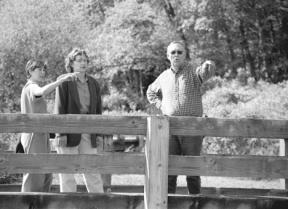A persistent buzzing could be heard Monday at the Possession Beach Waterfront Park.
The sounds of mosquitos are something the Port District of South Whidbey hopes will soon come to an end at the park.
On Monday morning, Lynae Slinden, president of the Port and Art Pratt, caretaker for the park, met with a representative from the Northwest Coalition for Alternatives to Pesticides to talk about how to reduce the mosquito population at the park and head off a potential outbreak of West Nile Virus.
The walk and talk at the park was scheduled to include television coverage, until KING 5 News begged off on the sunny, warm day because four cameramen were busy covering news in Tacoma.
Slinden and Pratt hope that Aimee Code, a water-quality and right-to-know coordinator for NCAP, can give the Port ideas on how to effectively get rid of mosquitos without any chemicals or pesticides.
Code, who came up from NCAP’s office in Eugene, Ore., said the Port is taking pro-active action to reduce the mosquitos before they are a problem. That the Port will do it pesticide-free makes her even happier.
The Port abandoned its plans to use Mosquito Dunk — solid pieces of the bacteria Bacillus thuringiensis israelensis, or Bti — that are dropped in water to kill mosquitos.
According to Slinden, the pesticide-free direction is something the Port has tried to administer, but has been overlooked in the past few years. Bringing NCAP in will head the Port back in the right direction, according to Slinden.
Code walked around with both Slinden and Pratt to familiarize herself with where mosquitos are breeding at the park. Pratt and Slinden recognized many areas where mosquitos can breed.
Walking through clouds of recently hatched mosquitoes, Code found a slightly uneven gutter growing a small plant in one end — something she said is a sign water is pooling and making a home for mosquito larva.
Holes in a lawn left where trees were removed in previous years, and empty gardening containers collecting water also caught Code’s attention. She said an inch of water in a small bucket can produce over 1,000 mosquitos every week.
Code said on Whidbey Island there are approximately 19 different species of mosquitoes, six of which are able to carry the West Nile Virus.
Code gave several ideas on how to eliminate mosquitos on Whidbey Island, including draining puddles and empty wheelbarrows of standing water, unclogging rain gutters, getting rid of old hubcaps and tires stored outdoors, and encouraging mosquito-eating animals such as bats and swallows to live nearby.



